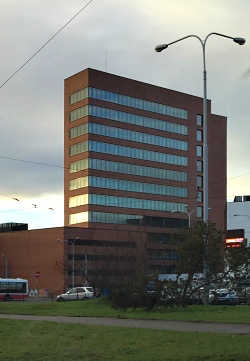
Construction should improve by six to seven percent this year
The Czech construction industry returned to growth in 2014 after six years of decline, improving by 4.3 percent. Data for this year is not yet available; the Czech Statistical Office will release it on February 8. However, numbers for the first ten months indicate that growth should continue this year as well. According to expert estimates, it will add another six to seven percent.
"The growth of the Czech construction industry this year is primarily driven by a significant increase in investments in transportation infrastructure. This is mainly funded by public investors who are trying to maximize the drawdown of European funds," said Jiří Vacek, director of the analytical company CEEC Research. According to a survey conducted by this company, which contacted 109 key representatives of domestic construction companies, the Czech construction industry is expected to grow by 6.6 percent this year.
The Czech Union of Entrepreneurs in Construction (SPS) has a practically identical estimate. "The Czech construction industry is developing positively at first glance this year. However, a closer look reveals that the positive development is not continuous, and the sector continues to progress in jumps. According to us, the construction industry will grow by seven percent this year," estimates the union's president, Václav Matyáš. "If the current trend continues, we expect to return to pre-crisis levels around 2018 to 2020," he anticipates. In 2008, the value of construction output in the Czech Republic reached a record 547.5 billion crowns. In 2013, it fell to 397.5 billion CZK, a decrease of 27.4 percent. This year, according to SPS estimates, it should lag approximately 14 percent behind pre-crisis levels with 470 billion crowns.
So far in 2015, construction has year-on-year grown in nine out of ten assessed months. The highest increase was in July (by 11.6 pct), with over ten percent growth recorded from March to May. Conversely, in October, it decreased by 1.3 percent. Ground construction performed best in March (by 7.3 pct), with the least success in September, where it shrank by six percent. Civil engineering, which mainly consists of the construction of transportation infrastructure, has grown throughout the year, even by 30.6 percent in June.
From January to October, 21,945 flats were started in the Czech Republic, which is 7.2 percent more year-on-year. The most were in Prague (4,144), followed by the Central Bohemian Region (3,929) and the South Moravian Region (3,286). Of these, 11,496 were for family homes, indicating an increase of 6.7 percent. Builders started the most flats in Central Bohemia (2,936), in Southern Moravia (1,513), and in the Moravian-Silesian Region (1,206). The number of started flats in apartment buildings increased by 2.7 percent year-on-year to 5,483. The most were accounted for Prague, with 3,129.
From January to the end of October, authorities issued 67,291 building permits, which is a 0.5 percent increase year-on-year. The estimated value of these constructions rose by 0.9 percent to 212.68 billion crowns.
The number of construction contracts for companies with 50 or more employees increased by 8.2 percent in the first three quarters of this year to 35,990. However, their value decreased by 2.5 percent to 135.3 billion CZK. "The volume of contracts reaches the golden times before 2009. The average price is, of course, lower, but we currently have plenty of contracts," said Ivo Luňák, director of Tyros Loading Systems CZ.
The growth of construction is expected to continue in the coming years. Directors surveyed by CEEC Research anticipate a 4.5 percent increase in production in 2016 and a further three percent in 2017. "Next year, the sector will be driven more by ground construction, which is financed primarily from private sources," Vacek added. "I expect very moderate growth, which will be influenced by the readiness of suppliers to draw European grants and the shape of the new public procurement law and the EIA law," concluded Pavel Pilát, general director of Metrostav.






